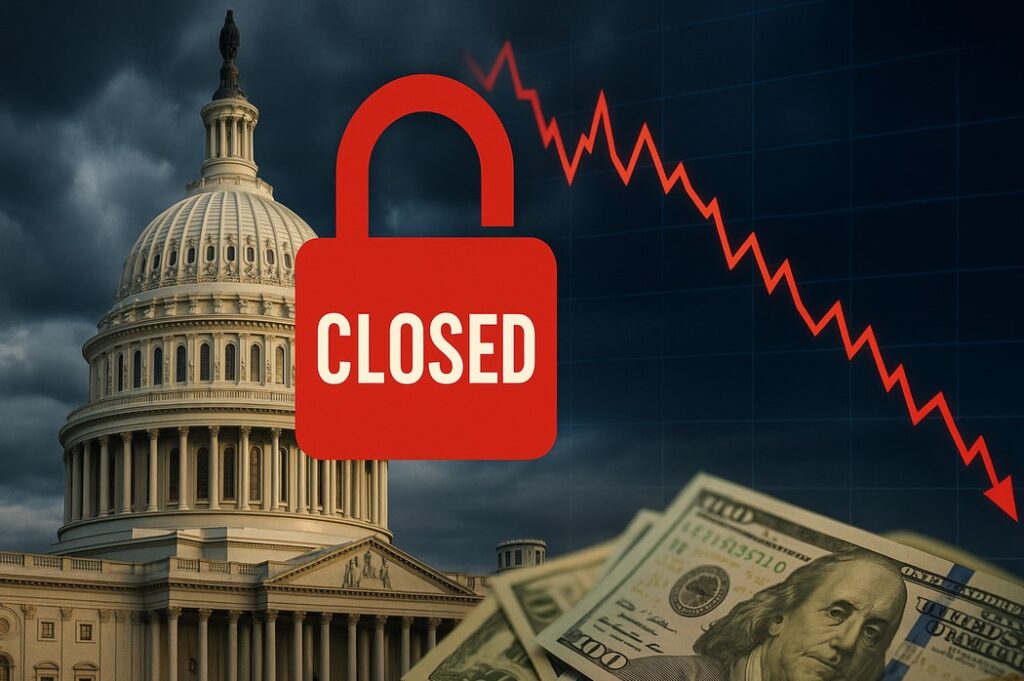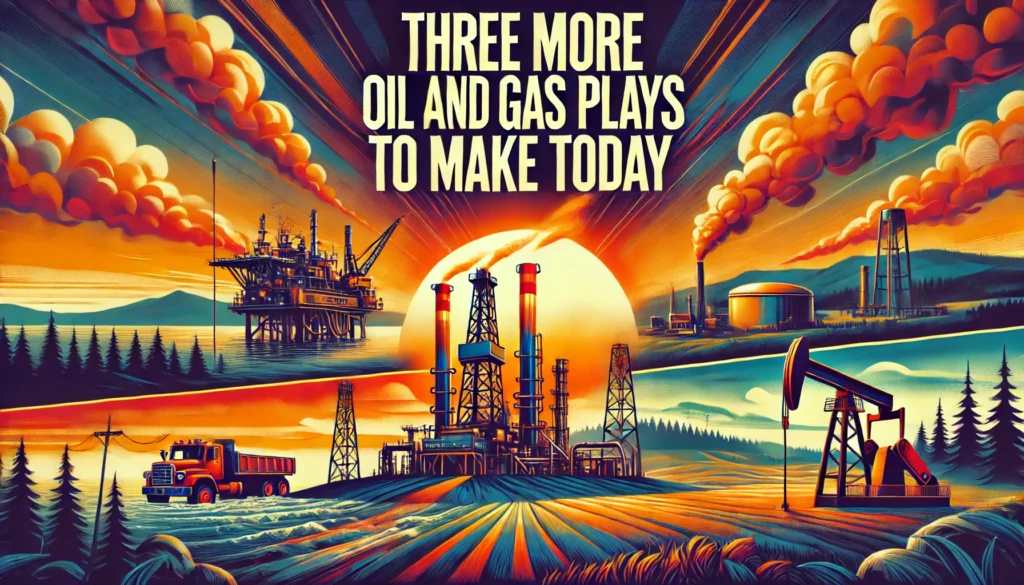- The stock market shrugs off government shutdown…
- When can you expect another Black Monday?…
- From the desks of President Trump and Robert Kiyosaki… this book isn’t available anywhere else. That’s unfortunate for most Americans. The good news is you can get a copy. Go here to see why it’s so important — and exactly how you can get your hands on it.
Dear Reader,
Today is S+1 — the United States government remains partially shuttered for the second consecutive day.
Wall Street’s reaction to the apocalypse has been markedly… muted.
In fact: Within 24 hours of the closure, the S&P 500 crossed 6,700 for the first time ever.
Why?
After all: A government shuttering represents uncertainty. And the stock market dislikes uncertainty.
Perhaps investors consider it a transient nuisance rather than an enduring menace.
Perhaps they believe the market tailwinds push more than the political headwind pulls.
More of a Political Event
Here CNN cites Mr. Eric Teal of Comerica Wealth Management:
- “I think it’s more of a political event than a market event,” Teal said.
- Corporate earnings continue to beat expectations, providing enough fuel for the market rally to continue at least until investors parse through third quarter earnings results in the coming months, Teal said.
- Indeed, corporate America’s profits have yet to display signs of slowing down, defying expectations and providing fuel for stocks to move higher. Stocks have also rallied on optimism about the Fed cutting interest rates.
Adds Mr. Ulrike Hoffmann-Burchardi of UBS Global Wealth Management:
- We advise investors to look past shutdown fears and focus on other market drivers, such as the mix of continued Fed rate cuts, strong corporate earnings and robust AI capex and monetization.
As history runs, this advice is sound advice. The stock market has often shrugged its shoulders against government closures.
Maybe the Government Should Close More Often
During the most recent government closure — from December 2018 to January 2019 — the S&P 500 jumped nearly 12%.
During the 16-day closure of October 2013, the S&P 500 advanced 2.65%.
Only during the three-day 1990 closure did the stock market truly wobble — a 3.57% slippage — though it transpired amid substantial recession tremblings.
Here Benzinga gives the exhaustive history, 1981-2018:
| Shutdown Entry Date | Exit Date | S&P 500 Entry Price | S&P 500 Exit Price | Return (%) |
| Nov. 17, 1981 | Nov. 24, 1981 | 120.81 | 122.92 | +1.75 |
| Oct. 1, 1982 | Oct. 5, 1982 | 120.40 | 121.60 | +1.00 |
| Nov. 11, 1983 | Nov. 16, 1983 | 164.39 | 165.38 | +0.60 |
| Oct. 4, 1984 | Oct. 9, 1984 | 162.44 | 162.16 | -0.17 |
| Oct. 17, 1986 | Oct. 21, 1986 | 239.50 | 236.03 | -1.45 |
| Dec. 21, 1987 | Dec. 22, 1987 | 249.14 | 249.56 | +0.17 |
| Oct. 8, 1990 | Oct. 11, 1990 | 311.50 | 300.39 | -3.57 |
| Nov. 15, 1995 | Nov. 21, 1995 | 589.29 | 596.85 | +1.28 |
| Dec. 19, 1995 | Jan. 9, 1996 | 607.01 | 618.46 | +1.89 |
| Oct. 2, 2013 | Oct. 18, 2013 | 1691.90 | 1736.72 | +2.65 |
| Dec. 26, 2018 | Jan. 29, 2019 | 2363.12 | 2644.89 | +11.92 |
Where the Market Should Be 12 Months From Today
Based upon the historical evidence… where should you expect the S&P 500 to settle one year from today?
Reports the Kobeissi Letter:
- If history repeats itself, the S&P 500 will close at ~7,600 in 12 months from today. The average 12-month return after a shutdown ends is +13%.
13% is plenty handsome.
Yet as I am fond to say: Climate is what a man can expect. Weather is what he actually gets.
And lots of weather can come barreling through over the following 12 months.
Thus the 13% projection is subject to vast variability.
The “October Effect”
Let us, however, center our attention on the present month.
It is October.
The Panic of 1907, the Crash of 1929, “Black Monday” 1987… they all descended in the month of October.
October’s reputation is so villainous, so felonious, it has even earned a title:
The “October effect.”
The historical record demonstrates that October is not the stock market’s most perilous month.
September has earned that high distinction.
Yet it cannot be denied that October has witnessed three of Wall Street’s deepest plummets.
Let us consider the most recent of these — 1987’s Black Monday.
It Never Should Have Happened
Market observer Charlie Bilello has ransacked the historical record.
“Sigma,” in the statistical symbology, equals standard deviation from the mean.
This fellow’s researchers reveal that the likelihood of even a five-sigma event is “essentially zero” on any given day.
His researches further indicate that Black Monday was a 17-standard deviation event.
Probability theory suggests a 17-sigma event should never occur in the entire 4.6 billion year history of Earth. Not on one single occasion.
Yet it did on that black October day in 1987.
Then certainly you cannot expect another 17-sigma event in this lifetime — or any other lifetime.
That which should not occur once in the history of the universe… almost certainly would not occur twice in the history of the universe… correct?
Have another guess.
Once Every 104 Years
With three mathematical men in tow, Harvard finance professor Xavier Gabaix conducted a study — “Institutional Investors and Stock Market Volatility.”
They ransacked decades of stock market history, both home and abroad, to rig a formula figuring the frequency of these events.
The results?
They conclude you can expect a Black Monday-level event… once every 104 years.
Does that mean you can safely snooze until 2091?
It does not.
Financial writer and analyst Mark Hulbert:
- Note carefully that this doesn’t mean a crash this big will occur every 104 years. This instead will be their average frequency over long periods. So it’s possible that we will not experience another 1987-magnitude crash in our lifetimes — or that another will occur today.
Again: Climate is what a fellow can expect. Weather is what he actually gets.
A storm of monstrous intensity may only be expected once in 104 years — on average.
Yet an identical storm may blow in the year after the first… the second year after the first… or the thirty-third year after the first.
We speak, once again, of averages.
The nearly impossible transpired in 1987.
Why can’t it transpire again?
After all, what were the odds that Donald Trump would twice be elected United States president — first in 2016 — and again in 2024?
Regards,
Brian Maher
for Freedom Financial News




